| |
Visitors and Guests
During the Germany years, the Armored Cavalry Regiment was host
to a wide variety of significant, important or just plain
interesting visitors from the United States. Fulda was
convenient to the Rhine Main airport and the first rate troopers
found in the Regiment were always willing to provide an
equipment demonstration, briefing and border tour. The first
squadron was the usual host but on occasion, visiting
dignitaries and notables also included Hersfeld and Bad
Kissingen on their itinerary. While rumors persist to this day
that everyone from Richard Nixon to Elvis Presley stopped at
Daley Barracks or the border camp, our goal here is to recall
the visits that were documented. As facts and images become
available, we will update our list and if you can provide any
additional detail, please send an e mail.
The Secretary of the Army
May 1977
The visit of Secretary of the Army Clifford Alexander, Jr. to
USAREUR in the late Spring of 1977 was not reported by the
Blackhorse Newspaper. Mr. Alexander was moving fast and the
reporters probably had trouble keeping up. Hidden in Lee
Reeder’s files, however, were four wonderful 8 x 10 color
photographs of the Secretary as he passed through OP Alpha and
then met troopers of the Eaglehorse while participating in
Exercise "Certain Fighter".
The "slugs", official
captions taped to the back of the images, provide scant
additional data. The photographs were from Alexander’s 1- 6 May
visit to Germany and the names of three Eaglehorse troopers were
recorded, SCO Gilbreath, Troop F Commander CPT James D. Young
and Platoon Sergeant Artis Williams. Interestingly, the gun
barrel of an H Company tank is prominent in one of the images.
Apparently, Alexander talked, gawked and walked; one has the
sense that his UH 1 hardly cooled down during the course of the
visit. Nevertheless, the troopers probably still recall the day
when one of the memorized names from the highest level of their
chain of command suddenly appeared, reached out his hand and
said, "Hello!".
The Honorable Clifford Alexander, Jr.
Mr. Alexander served for the full four years of the Carter
administration and as is often the case, his contributions are
best appreciated when viewed in the long term. In many respects,
from significant personnel policies through major combat
equipment, the Army that deployed to the Middle East to eject
Iraq from Kuwait began to form during the period 1977 - 1981.
From personnel and pay to equipment and extending to the very
soul of the Army as an institution based on merit and
professionalism, Clifford Alexander, Jr. left a lasting mark.
An early challenge faced by the Secretary of the Army in 1977
and 1978 was to marshal continued support for the troubled
volunteer Army force. At the Pentagon, Chief of Staff of the
Army General Bernard Rogers and in Germany, the V Corps
Commander, LTG Sydney Berry, called for a return to the draft to
meet shortfalls in both quantity and quality of troops. Of
particular concern were the shrinking numbers of the Individual
Ready Reserve and Reserve Component Units. General Rogers
doubted that the necessary men to support the Army in the event
of war could be activated quickly and he openly campaigned for a
return to conscription.
| |
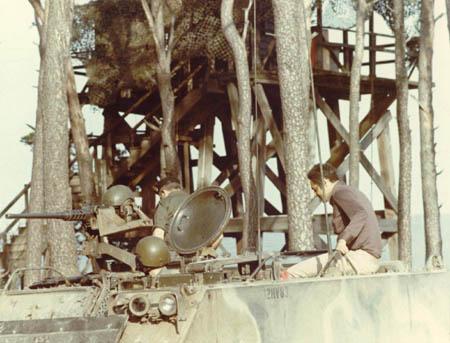 |
|
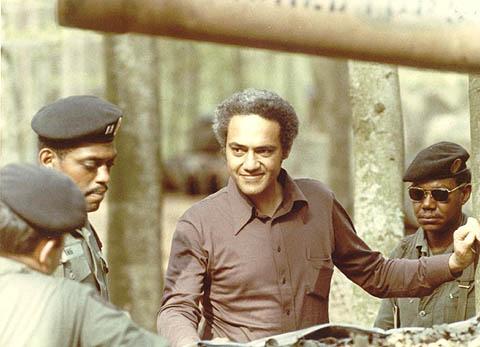 |
|
| |
Secretary of the Army
Clifford L. Alexander, Jr. takes a ride in an APC at an observation
outpost on the East German border near Fulda. Alexander viewed
activity across the border through special equipment at the site.
The secretary was on a whirlwind tour of the V Corp exercise
"Certain Fighter" while on his first visit of US Army intallations
in Germany May 1 - 6. --Rudi Williams |
|
Army Secretary Clifford L.
Alexander, Jr. listens to comments by LTC John C. Gilbreath,
commander, 2/11 Cav, V Corps during the Secretary's visit to units
in the field during V Corps exercise "Certain Fighter". Looking on
are CPT James D. Young, 29, F Troop commander and PSG Artis
Williams. --Rudi Williams |
|
Mr. Alexander, working
under strict budget constraints imposed by Secretary of Defense
Harold Brown, countered that increased pay and benefits would
solve most of the problems in the VOLAR and that quality troops
would then flow into the Reserves following service on active
duty. The return to the draft talk ended and the first of many
significant pay increases began. An entire new approach
considering the importance of both quality of life and fair pay
was initiated in the military and those initiatives continue to
this day.
The full integration of women into the Army began under
Secretary Alexander as the Directorship of the Women’s Army
Corps was dismantled and the first attempts for seamless
inclusion of women began. Congress and the Pentagon were
skeptical of the program and hearings were held in Congress in
1977 over the high number of sexual abuse claims rising from the
55, 000 women on active duty in the Army. Alexander believed
that increases in pay and vigorous recruiting would bring both
quality men and women into the Army and that as more women began
careers as junior officers or rose through the enlisted ranks to
the NCO grades, any lingering systemic prejudice in the Army
would be worn away. As of 2005, women make up more than 27 % of
the total Army force.
Arguably of greatest significance in personnel matters,
Secretary Alexander worked to extinguish the last traces of
institutional racism from the promotions boards for senior
officers. In 1977, Mr. Alexander sensed that the "green wall"
for black officers existed at the promotion point to brigadier
general and he actively worked to overhaul selection criteria
and promotion board procedures to create a color blind system.
Historians agree that the career of General (Ret) Collin Powell
could easily have stalled at the grade of colonel if not for the
efforts of Alexander to insure that race could not be used in an
overt or covert fashion to block otherwise qualified officers
from the general officer ranks.
On the equipment side, Secretary Alexander worked for continued
funding for the M1 and M2 programs as well as a host of other
innovations that would be fielded in the mid and late 1980s. He
did not consider himself a technical expert but took careful
counsel from his staff on the developmental needs of the Army
and in an era of limited defense budgets that had to accommodate
both conventional weapons and the massive and expensive nuclear
force, Alexander worked to find sufficient money to keep key
programs rolling forward. Interestingly, both the equipment
evolution and political negotiations that led to the Pershing II
deployment in Germany that President Regan so skillfully
marketed, began as a Carter - Brown - Alexander plan.
Mr. Alexander contributed to the formal guidelines that evolved
into the Base Realignment and Closure Plan that worked to
eliminate politics as much as possible, from the basing
considerations of the military. The basic framework he
established is still in use as the planned final round of basing
review and alignment completes its process.
| |
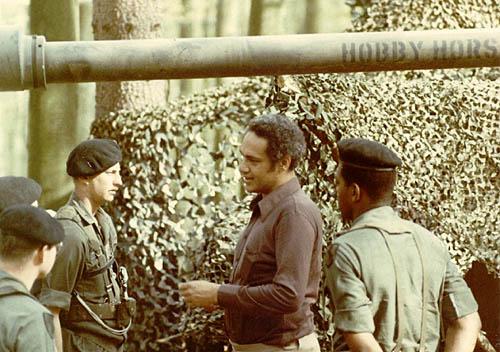 |
|
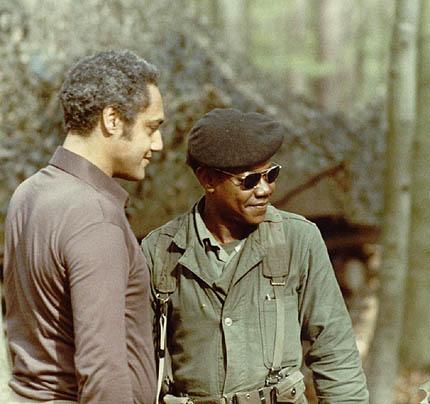 |
|
| |
Army Secretary Clifford L.
Alexander, Jr. talks to troops of the 2/11 Cav in the field during V
Corps exercise "Certain Fighter". Looking on at right is CPT James
D. Young, F Troop commmander. --Rudi Williams |
|
Secretary Alexander chats
with PSG Artis Williams of the 2/11 Cav during FTX. --Rudi Williams |
|
In retrospect, much of the Army recalled from the mid and late
1970s seems an untidy affair. Personnel quality, drug abuse and
racial strife undermined unit readiness and morale. Many of
these problems were inherited from the Ford administration and
can be attributed to the post Vietnam "hang over" that gripped
both the Army and the nation. The initial VOLAR programs of 1972
thru 1975, complete with "soldier counsels" and "brigade
commander rap sessions" were conceived with the best intentions
but often forgot that a combat warrior force is not modeled
after a union shop or an academic debating society. Drug abuse
was prevalent in the American society as a whole and the Army,
in both the best and worst sense, reflected the population it
stood to defend. For a few hectic years in the 1970s, the
military lost its sense of discipline and mission.
The Carter administration and the Brown - Alexander initiatives
sought to address many of the significant problem areas they
found in the Army. With only four years to work, it may have
been difficult to see significant immediate improvements during
the tenure of Mr. Alexander, however, when the Army that
deployed to Desert Storm is considered, from personnel to
structure through equipment, much of what President Regan bought
with massive budgets began as programs initiated under Carter -
Brown - Alexander.
Long after departure from
government service, Mr. Alexander is still very active in a wide
variety of consulting positions. A list of links providing
greater detail of his public and private sector career is below.
US Army biographical sketch of Secretary Alexander.
National Football League Players
March 1978
During the first week in March, 1978, four NFL players, Russ
Francis, Patriots, Willie Brown, Raiders, Mike Montler, Broncos
and Lawrence McCutheon, Rams, toured Germany and the 7th Army as
part of a USO sponsored event. It was a fast paced, month long
visit for the players and the Blackhorse Newspaper printed a
photo as they visited OP Alpha. The caption indicates the party
also stopped at Daley Barracks or Camp Lee but without further
detail. Mike Montler recalled the trip.
Mike Montler
"What a wonderful time! That season, I had played for the
Broncos and we went to the Super Bowl. Although we lost to
Dallas, it was an event of a life time. I think it was late in
the season or maybe after the Super Bowl, the public relations
guys asked me if I wanted to go on a tour to meet US military
soldiers in Germany. How could I say no? Most of the good stuff
went to the quarterbacks and such, I was an offensive line guy
so I jumped at the chance. I think they also remembered that I
had interrupted my college playing days at Colorado to be a US
Marine for two years and had even played for the Marine club
team in San Diego. I was the right guy for that job."
"I wish I could fill in more of the detail and to be honest, I
don’t recall Bad Kissingen or Fulda as particular places. We
toured in a big bus and it was a little like the movie Animal
House! As we crossed Germany, a unit guide would join us and we
would visit several bases to meet troops over a two or three day
period. Then when that guide was done, we would drive some more
and link up with the next guide and the visits would start all
over again. Many times, it was the small, out of the way rocket
bases and such that do stand out in my memory. It was all very
informal and much fun. We would talk to the soldiers face to
face while they were working, answer questions, sign autographs,
recall the past season or speculate about the next one and share
a meal if it was lunch time. I do remember when we took a
helicopter ride along the border - that was very impressive."
| |
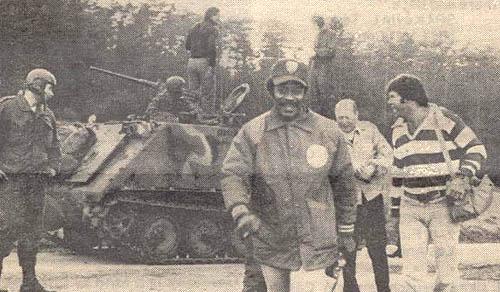 |
|
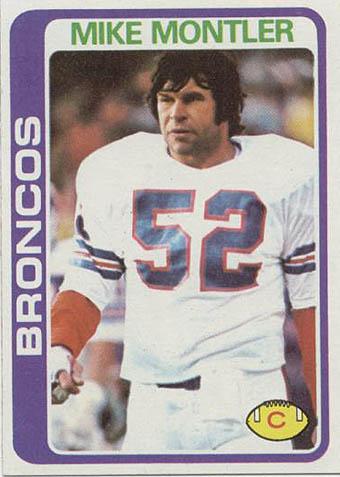 |
|
| |
NFL players seem pleased
about a 15 minute ride they took in an APC after their tour of OP
Alpha, 1/11 ACR border camp. On APC with back to camera is Russ
Francis, Patriots, in front from L to R: Willie Brown,
Raiders,William Granholm, NFL Assist. Commissioner and Mike Montler,
Broncos. Not pictured is Lawrence McCutheon, Rams. The NFL stars
toured the four squadron areas during a two day stay, 3 - 4 March.
--Reeder |
|
Mike Montler's Topps Card
from his Super Bowl year with Denver. --Topps Cards |
|
"At nights, we stayed in
local hotels and bed & breakfast places and if we weren‘t
scheduled for visits on a particular day, we became regular
tourists. Each of us was well over six feet three inches and two
hundred fifty pounds plus, we were the biggest Americans the
Germans had ever seen! From the Army to the Germans, everyone
treated us great."
"Our bus driver and translator was named Dieter Scheibolt and he
was memorable. We would bet him that he couldn’t get that
touring bus up these narrow - winding roads leading to castles
and such … and he would smile and up we’d go at high speed;
often it seemed there was a lot more bus than road but Dieter
made it every time, even it meant that after the castle visit,
he would have to back the bus down that dangerous road to get us
out! We would try and teach him American English and he taught
us a few German phrases"
"I do recall Berlin. We visited the troops and then our bus
proceeded across the border for a day long tour. We visited a
huge military cemetery, toured the austere city, saw their Tomb
of the Unknown Soldier and watched the ceremonial changing of
the guard. Because of my military experience, all this made a
big impression on me. That night, we had dinner at a very formal
restaurant and it seemed like we had gone twenty years back in
time and it was a set out of some spy movie."
"I was glad to have made that USO trip, I learned a lot and I
think the soldiers we met enjoyed the visits. After we returned,
I played one more season and then left football for a new
career. Now fully retired, I have many souvenirs around the
house from ten years of professional ball with some great teams
and Hall of Fame players. On the mantle, I have a beer mug I was
given while on that Germany tour. When I see it, I always smile
and recall that wonderful trip."
|
|